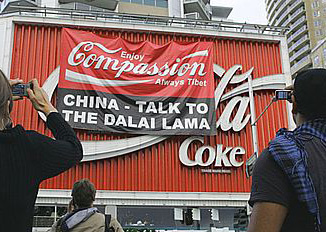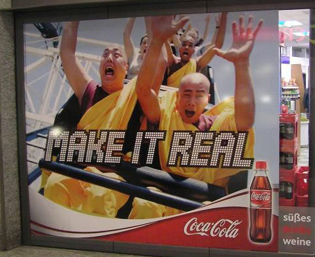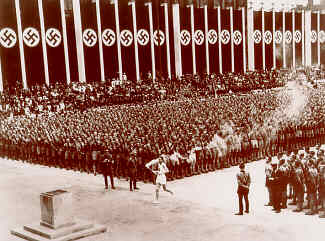San Francisco: Responding to a question about Coca-Cola's sponsorship of the Olympic Torch Relay, Mr. Isdell, CEO of Coca-Cola, defended the sponsorship by referring to the Olympic Torch as a symbol of hope and openness.

Banner in Sydney, Australia |
|
Ongoing protests around the Olympics Torch Relay to highlight China's occupation of Tibet is a refreshing reminder that no amount of "feel good" advertising and "brand" associations can whitewash the reality - that the Chinese government suppresses human rights in Tibet.
China is not the first government that has attempted to use the Olympic Games to gain credibility from a global audience. In 1936, the Olympic Games were held in Nazi Germany, and the Nazis had the same goal - to extract credibility from the world community. For Coca-Cola, however, the Olympic Games and the Torch Relay provide a tremendous marketing opportunity, associating its brand with the feel good games that has arguably the largest audience in the world. Coca-Cola has reportedly invested more that US$100 million into the Games. The promise of financial returns from the sponsorship are too great for any human rights or environmental concerns to put a damper on their plans. 
Actual Coca-Cola Advertisement with Monks |
|
While China hopes to benefit politically by hosting the Olympic Games, Coca-Cola aspires to profit financially from the Olympic Games. Coca-Cola, it seems, will sponsor just about anything, as long as it sees potential profits.
The 1936 Berlin Olympic Games were used by the Nazis to paint a picture of Germany as a peaceful and tolerant Germany, even though the persecution of Jews, Romas and others deemed undesirable by the state in Germany had already started. The first permanent Nazi concentration camp had opened in Dachau in 1933 - three years prior to the Olympics - and Jews were not allowed to participate in the Games. Coca-Cola was a primary sponsor of the 1936 Games. And the first modern day Olympic Torch Relay was initiated in Berlin in 1936, and Coca-Cola was its sponsor at that time too.
While the magnitude of horror inflicted by Nazi Germany is unsurpassed and we hesitate to make comparisons with China's oppression in Tibet, one must raise serious concerns about corporate sponsorships that do not take human rights concerns into account, as was and is the case with the Coca-Cola company.
In fact, Coca-Cola's involvement in Nazi Germany went further. While the Coca-Cola company was supplying Coke to Allied soldiers on the war front, its German counterpart, Coca-Cola GmbH, was busy selling Coca-Cola to Germans. When Coca-Cola GmbH could no longer receive the syrup from the US after the US entered the war in 1941, it developed a drink using ingredients available in Nazi Germany called Fanta. It seems that Coca-Cola had hedged its bets. If the Allies won, Coca-Cola would rule the world and if the Nazis won, Fanta would. 
Olympic Torch Run Arrives in Berlin, 1936 |
|
To be fair, Coca-Cola was not the only company to hedge its bets during World War II. But the extent to which companies will go to ensure future markets and profits, however unethical, is disturbing. And Coca-Cola's sponsorship of the Olympic Torch Run and the Beijing Games is just that - unethical and devoid of morality. It makes no difference whether Tibetans are murdered, tortured or intimidated by the Chinese government. Its mandate is to increase its sales in China, and it will do nothing to risk losing access to these emerging markets, particularly at a time when its sales in the US are declining as consumers become more health savvy.
The current protests around the Olympic Torch Relay are a perfect moment to scrutinize the role that corporations play in this day and age of globalization and send a clear message to the corporations that human rights must come before profits. On the one hand, there is increased talk of Corporate Social Responsibility - which is corporation's response to globalization - in which Coca-Cola figures prominently. Yet, when a pressing issue such as Tibet comes to the fore, Coca-Cola chooses to remain silent and endorse the Games for financial reasons, absurdly citing "openness" and "hope" to defend their involvement.
On March 20, 2008, over 150 Tibet support groups from around the world penned a letter to the Coca-Cola company labeling its sponsorship of the Games "tasteless" and asking it to ensure that the Olympic Torch does not go through Tibet.
If Coca-Cola is serious about being a good corporate citizen and even an average student of history, it must end its sponsorship of the Beijing Olympics to send a strong message that financial profits are secondary to human rights. Until then, we would encourage all torchbearers to cease being ambassadors for a company that is blind to everything except profits. And encourage consumers to think before they drink Coca-Cola. Coca-Cola's sponsorship, frankly speaking, is simply not Olympic in spirit.
Amit Srivastava is the Director of India Resource Center, an international campaigning organization based in San Francisco, USA.
India Resource Center works to support movements against corporate globalization in India, as part of a project of Global Resistance. Global Resistance works to strengthen the movement against corporate globalization by supporting and linking local, grassroots struggles against globalization around the world. Their goal is to ensure that those most impacted by globalization are engaged in and at the forefront of the movement against corporate globalization.
This is an old article but it's a good example of the kind of press IRC are producing. You can take action and read more here.







1 comment:
I would like to remind people here to be very careful about what they believe. I have heard a lot about Tibetans making up stories to suit western ears. Recently I found more evidence of this in Robert Barnett's essay 'Women and Politics in Contemporary Tibet'. You can read it online here through googlebooks:
http://books.google.com.au/books?id=DPlbN63QYEEC&pg=PA286&lpg=PA286&dq=many+many+women+crying+tibet&source=bl&ots=PERq4WwRLG&sig=UZoK3qla1iUbkaJXhBeO3RL_O80&hl=en&ei=uHx_S_XWF4Hg7APrnLTFBg&sa=X&oi=book_result&ct=result&resnum=1&ved=0CAYQ6AEwAA#v=onepage&q=many%20many%20women%20crying%20tibet&f=false
Barnett is a lecturer in International and Public Affairs and coordinator of Columbia University's Modern Tibetan Studies Program; therefore a trustworthy source. In his essay he describes this deceit, by a Tibetan woman in this case, as "performing her nation...by presenting a narrative that establishes her as part of the extended Tibetan body politic and identifies her within a history of nationality oppression and resistance." Barnett then goes on to say that Tibetans are able to buy copies of a particular event that occurred in Lhasa many years before and that some Tibetans use this "regurgitated story" to gain asylum in the USA, he writes; "Accounts of that event can be bought from tutors in New York to be memorized by asylum seekers". The purchasable story is based on this event covered in the New York Times:
http://www.nytimes.com/1987/10/04/world/china-denounces-tibetan-leader-as-responsible-for-violent-protest.html?pagewanted=all
I wish not to promote that these abuses do not happen, but we do need to question just how many of the forced sterilizations and other accounts of torture and so forth coming out of Tibet are fabricated to gain support and assistance from a sympathetic yet gullible audience.
Post a Comment